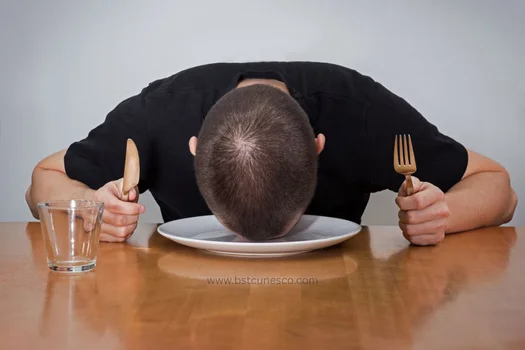Feeling tired and sleepy after a heavy meal is an experience that almost all of us have experienced. This phenomenon, colloquially called “food coma,” is something that scientists have been trying to understand for years. But what causes us to feel lethargic and sleepy after eating, instead of feeling refreshed and energized? In this article, we will explore this fascinating and complex phenomenon and discover the secrets behind it.
Evolutionary Adaptations: Our Ancestors’ Legacy
One interesting theory about post-meal sleepiness goes back to our evolutionary adaptations. Our prehistoric ancestors relied on hunting and foraging for food. These activities required a lot of alertness and energy. But after eating, their bodies entered a state of rest to restore stored energy. This “hunt, eat, rest” cycle is probably written into our DNA and still influences our behavior.
In fact, after eating, our bodies are influenced by hormones that promote rest and relaxation. These hormones signal our bodies that it is time to rest and conserve energy. This evolutionary adaptation may explain why, instead of feeling energized after eating, we feel sleepy.
The Role of Hormones: Orexin and Ghrelin
Hormones play a key role in controlling feelings of hunger, satiety, and sleep. Two important hormones in this process are orexin and ghrelin. Orexin is responsible for increasing alertness and wakefulness, while ghrelin is activated when we are hungry and signals the body that it needs energy.
After eating, ghrelin levels decrease and the body feels full. At the same time, orexin activity also decreases, which leads to feelings of sleepiness. These hormonal changes help our bodies enter a state of rest after eating.
Serotonin and Tryptophan: Calming Messengers
Serotonin, an important neurotransmitter, is also involved in this process. Serotonin plays an important role in regulating mood and sleep. The precursor to serotonin is the amino acid tryptophan, which is found in our diet.
After eating a heavy meal, blood glucose levels rise, which helps tryptophan be absorbed. Tryptophan is then converted into serotonin, which creates a feeling of fullness and relaxation. This increase in serotonin may contribute to feelings of sleepiness after eating.
Glucose and its effect on the brain
Glucose, the main sugar in the blood, also plays an important role in this process. After eating, blood glucose levels rise. This increase in glucose affects the neurons in the brain and reduces the activity of hormones such as orexin and ghrelin. As a result, we feel less alert and sleepy.
Digestion: High Energy Consumption
Digestion is a process that takes a lot of energy from our body. After eating a heavy meal, our body focuses all its energy on digesting food. This process involves the secretion of digestive juices, moving food through the intestines, and absorbing nutrients. All of these activities require a lot of energy and tire our body.
During digestion, blood flow to the brain and other organs decreases, as more blood is directed to the digestive tract. This decrease in blood flow to the brain may cause us to feel lethargic and sleepy.
Timing: Why don’t we get sleepy right after eating?
Interestingly, we don’t feel sleepy immediately after eating. Instead, it takes about 20 to 30 minutes for our bodies to process the food and then send the “full” message to our brain. This is when hormonal changes and energy levels start to drop, and we start feeling sleepy.
Conclusion: A Combination of Factors
Ultimately, sleepiness after eating is the result of a combination of factors. Evolutionary adaptations, hormonal changes, increased blood glucose, and the digestive process all play a role. Understanding these processes can help us communicate better with our bodies and live a healthier lifestyle.
If you want to avoid feeling sleepy after eating, you can eat lighter, more balanced meals and avoid heavy, high-fat foods. Also, taking a short walk after a meal can help improve digestion and boost your energy levels.
Resources:

